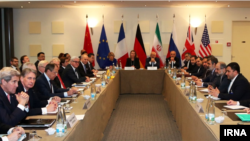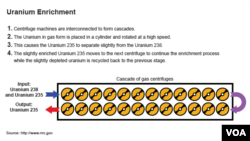The U.S. State Department says key issues remain in dispute with just about a day to go until the deadline to reach agreement on the main points of an accord between the United Nations and Iran on the future of its nuclear program.
State Department spokeswoman Marie Harf gave the talks just a 50-50 chance of success, saying several issues remain in play as negotiators seek the right balance of terms. But in a phone call with reporters, she disputed a story in Monday’s New York Times that said Iran has backed away from a commitment to ship its stockpile of enriched uranium to Russia.
“This notion that in the last 24 hours that somehow there’s been a shift in this issue, sort of a hardening of positions, just isn’t true," said Harf.
The Times story was based on a statement by Iran’s deputy foreign minister. But Harf said Iran’s position has not changed, and that negotiators are working on ways to make the enriched uranium unavailable for bomb making, which experts say could include such steps as diluting it and having the supply inspected frequently.
“What’s important to us is that we can get agreement about the path for them to basically get rid of a large part of their stockpile, so that the remaining stockpile, when put together with the number of centrifuges, the type of centrifuges, all of the different parts of the equation, gets us to a year breakout time," said Harf.
"Breakout time" is the amount of time it would take Iran to build a nuclear bomb. Currently, international experts put that at just two or three months. The six nations representing the United Nations Security Council want to extend that to at least a year.
Experts say if Iran is allowed to keep the enriched uranium in any form, it will stiffen opposition from some in the U.S. Congress and some U.S. allies in the Middle East.
But Ariane Tabatabai of Georgetown University’s Security Studies Program in Washington says any deal will face opposition.
“Could it be a good deal without the uranium being shipped out? Yes, it could be, depending on what other fixes we find to the other problems. But it would be extremely difficult to sell here (in
Washington). That said, any deal, for a number of people, would be a bad deal," said Tabatabai.
Even though the deadline loomed, Monday was a quieter day in the talks, with a lighter schedule of meetings with Iranian officials than in previous days, leaving observers to speculate on what was happening behind the scenes. Several European foreign ministers left the talks, but said they would return if a deal is at hand on Tuesday.
Tabatabai says it’s not surprising that this is the most difficult phase of the talks, with the toughest issues left to the end.
“There’s a lot to overcome. Thirty-six years of animosity and hostile relations are not going to be erased overnight. And then, of course, you have the challenges that any kind of negotiation faces. Both sides are trying to get more. It’s normal and, yes it’s challenging, but it’s what negotiations are about," she said.
U.S. officials have said they expect the talks to go until the last minute Tuesday night, and many observers expect them to go at least a little bit beyond. But Marie Harf says the deadline won’t be extended.
“March 31st is the deadline. It has to mean something. And the decisions don’t get easier after March 31st," she said.
The stakes are high, even though this is another interim step. The goal is to agree on the main points of an accord to guarantee Iran cannot build a nuclear weapon and to lift international sanctions against it. But officials have not even decided what form any agreement will take - written or oral, joint or separate, signed or unsigned.
The Iranian foreign minister, in particular, has expressed concern that any document would become a target for critics, potentially destroying the process.
U.S. officials say something will have to be made public, but Tabatabai says it does not have to be much.
“There just needs to be something that says to both domestic constituencies, but also U.S. allies elsewhere, that the negotiators are still committed and they have solved some of the issues and can move forward, and they are going to try to address all the details remaining in the next few months.”
Skeptics will want more, and those in the Congress and in the Iranian government will likely get it in secret briefings. But even if the negotiators get some sort of basic agreement, they acknowledge they will still have a lot of work to do to settle all the complex technical details by the end of June.
So, as important as the deadline is to prove that the negotiating process is moving both sides toward their goals, it’s only what one analyst called a milestone on a much longer journey.
White House correspondent Aru Pande contributed to this report.
View the timeline of Iran nuclear negotiations:





